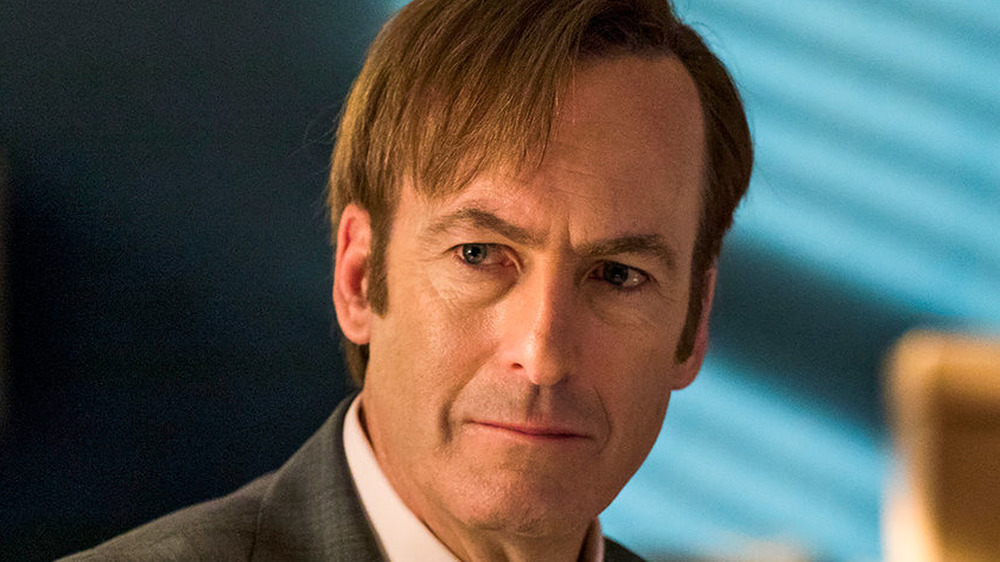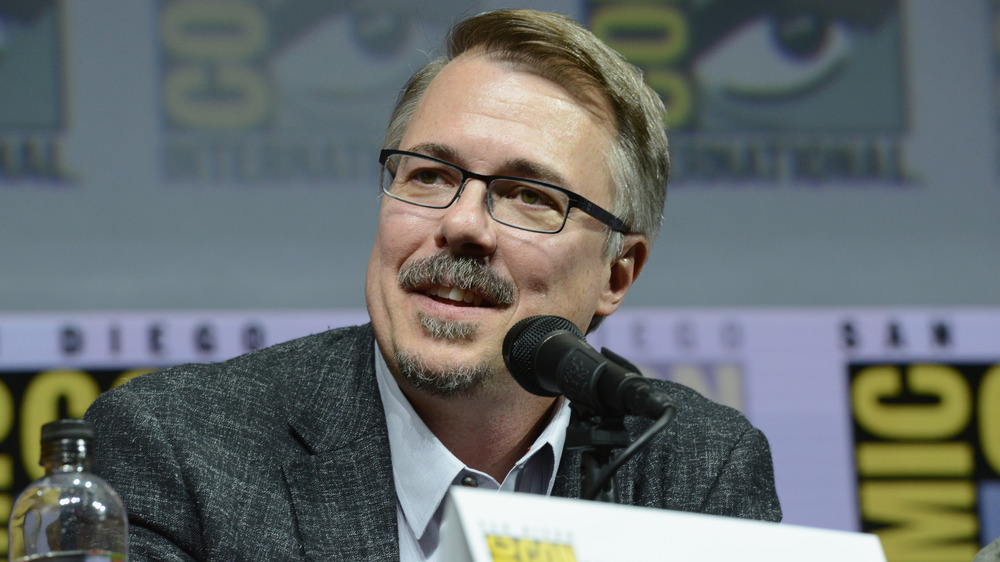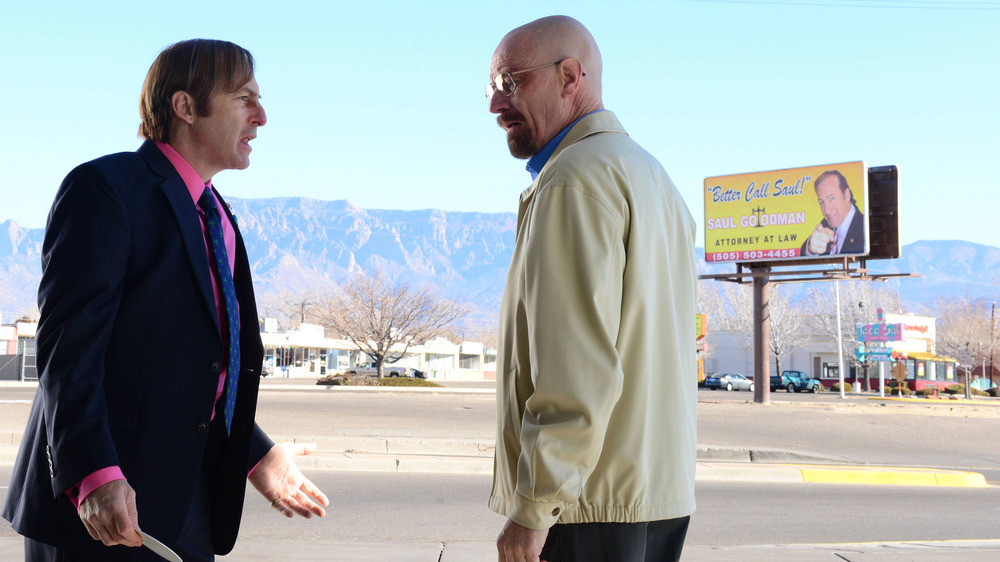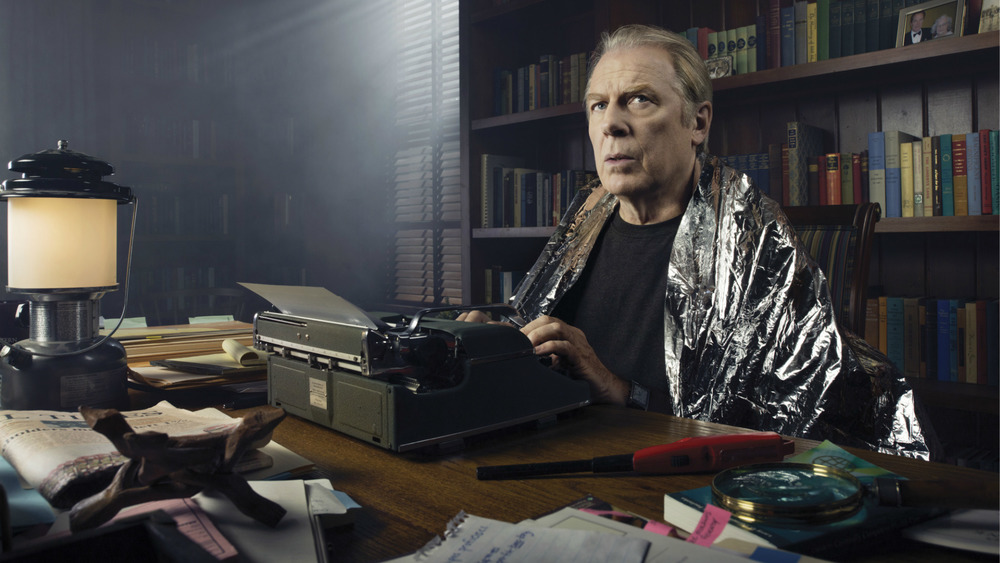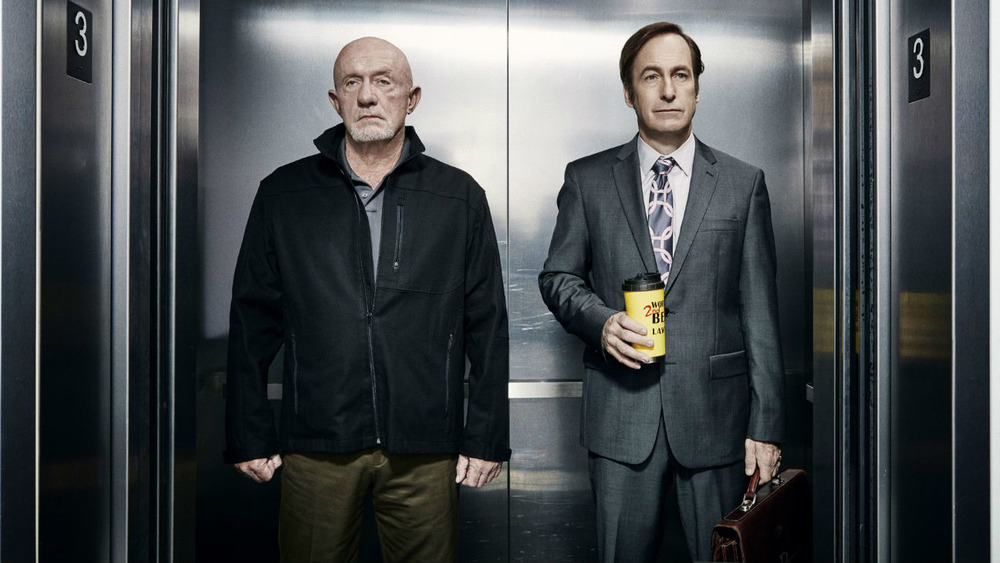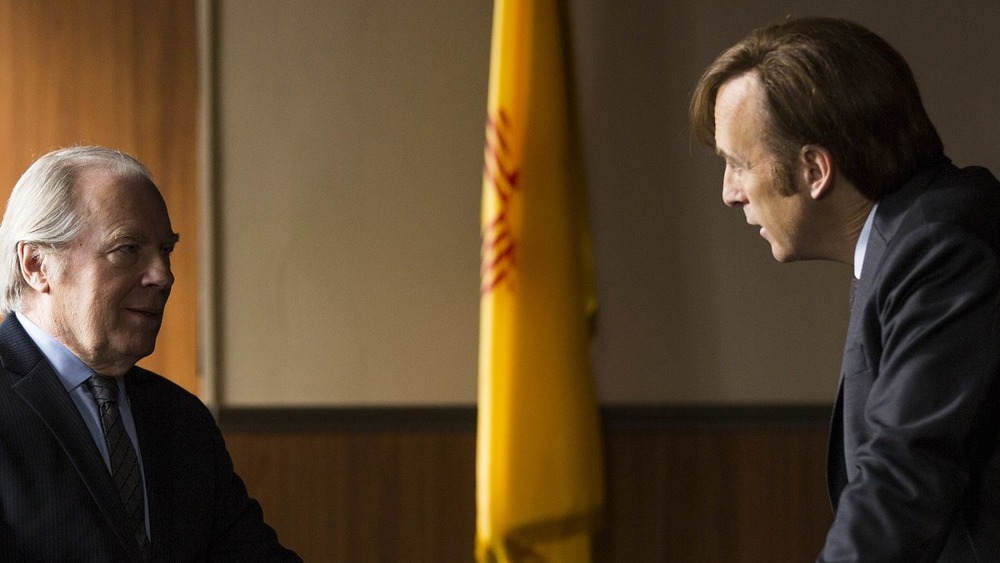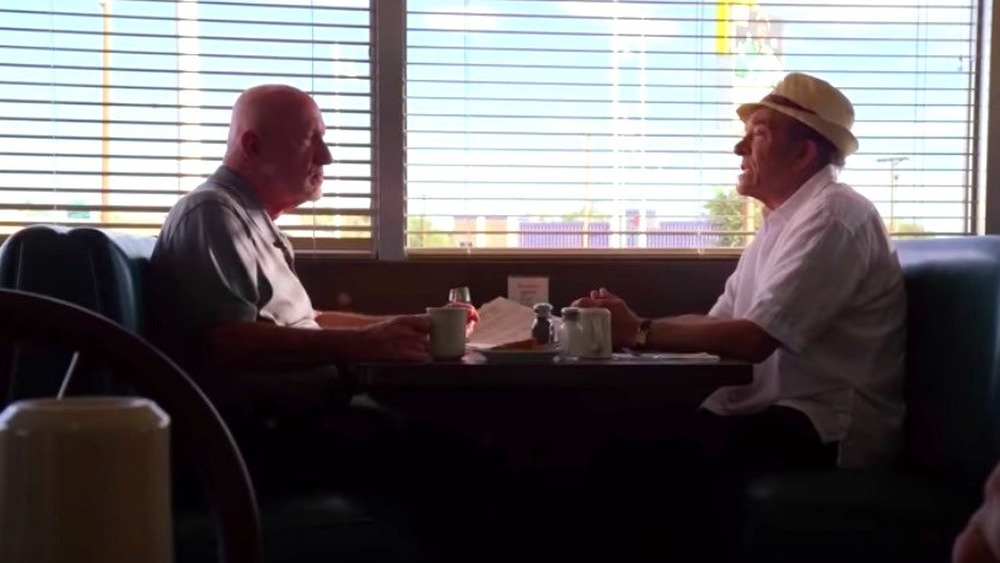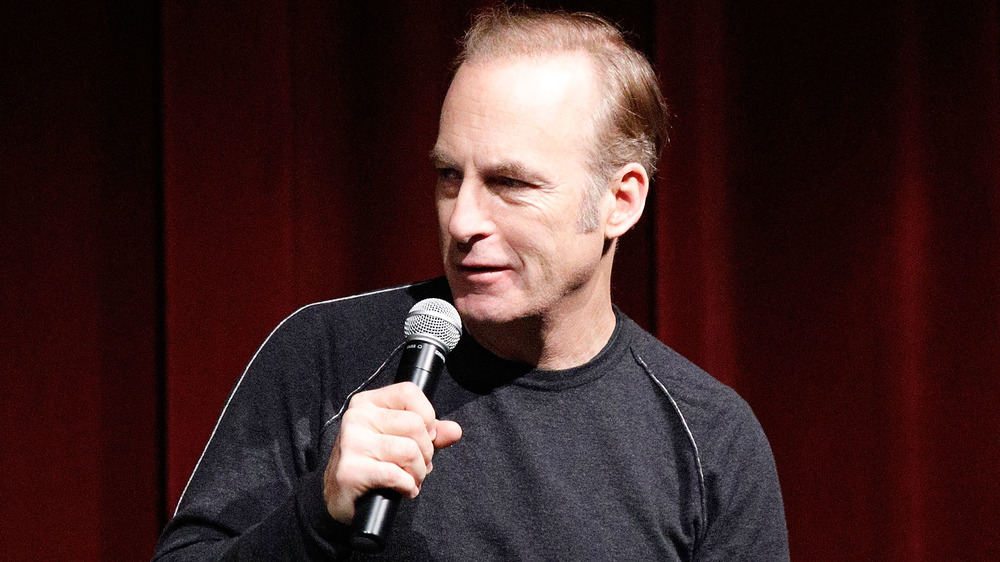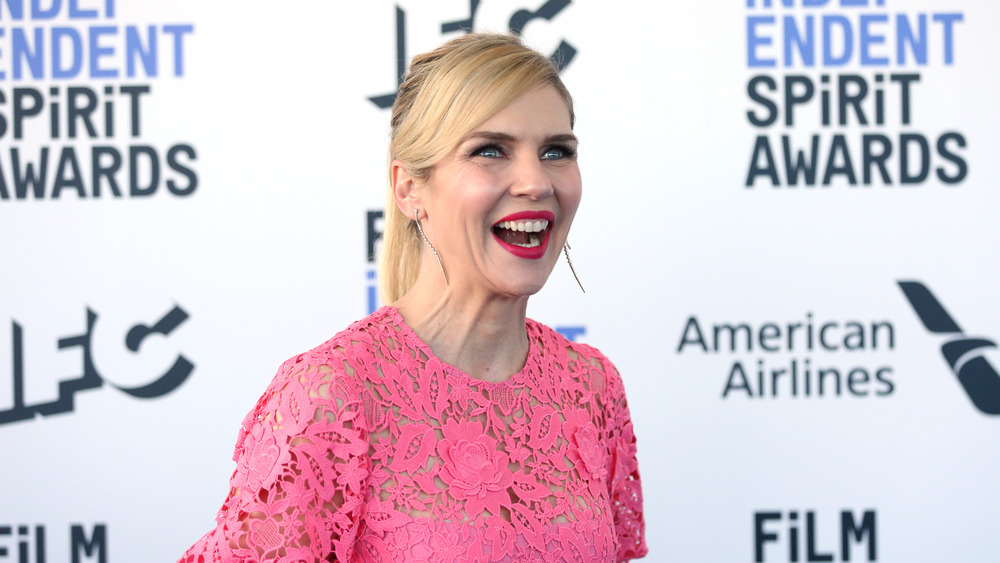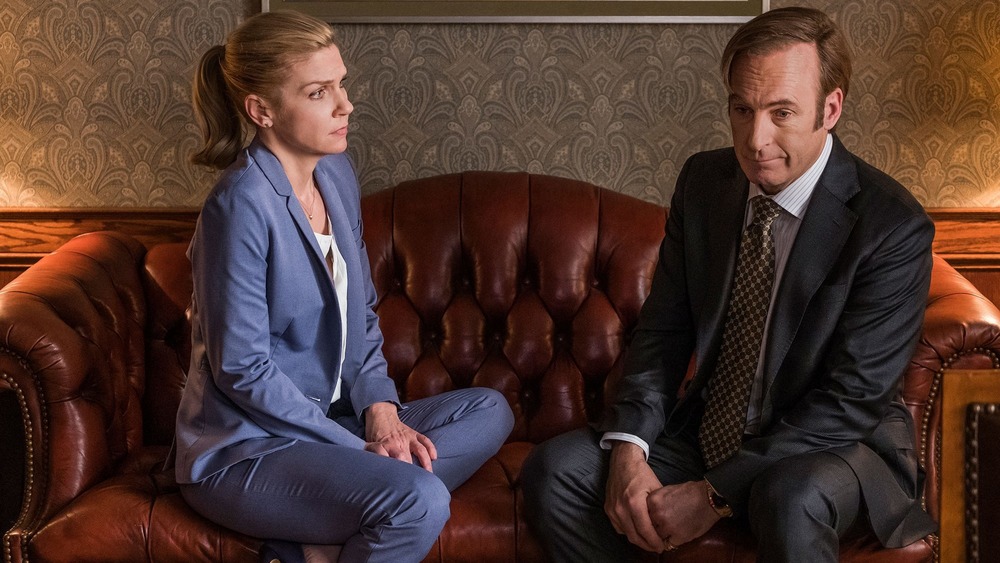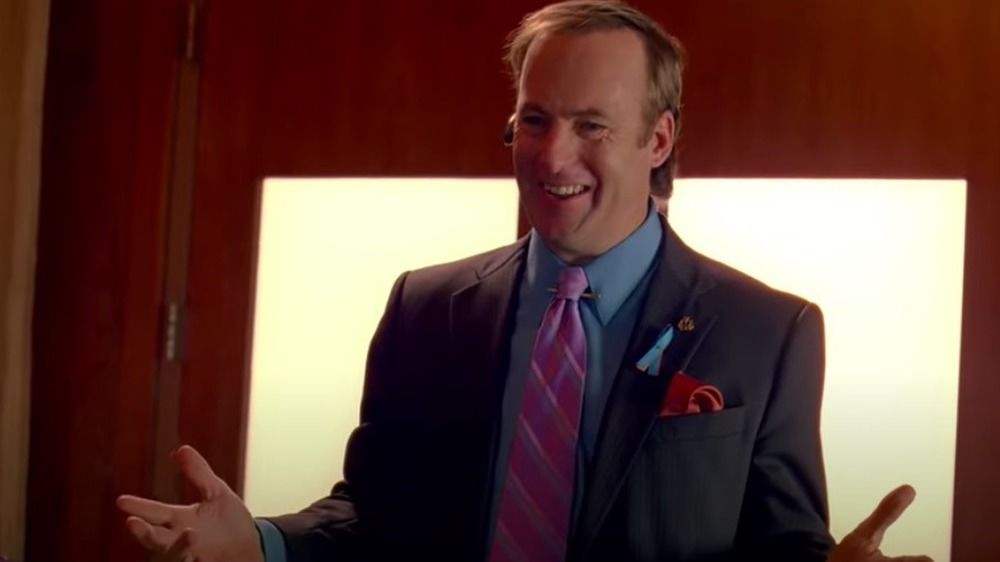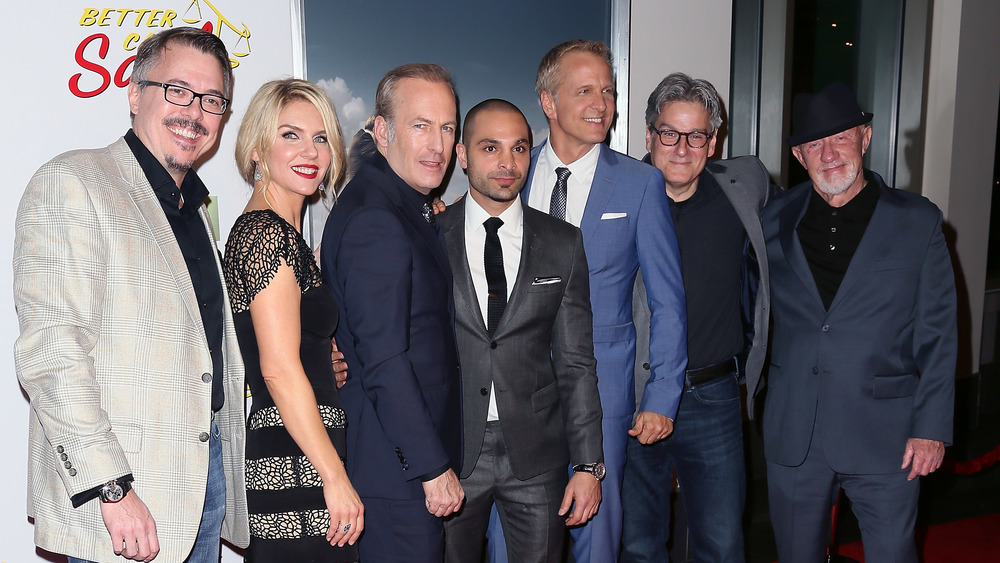The Untold Truth Of Better Call Saul
Some fans may have been skeptical when a spinoff to the widely acclaimed and popular Breaking Bad, created by Vince Gilligan, was announced in 2013. After all, the ending of Breaking Bad has been deemed pretty much perfect, so why mess with a good thing? Well, it turns out that the fans and critics had nothing to worry about, as the series has received a very positive response from the get-go. Each of the five seasons holds a 97-99% Tomatometer, with a 96-97% audience rating — it can't get much more well received than that.
Better Call Saul, created by Gilligan and Peter Gould (the latter of whom was a writer on Breaking Bad) follows the character first seen in season two of Breaking Bad, Saul Goodman (Bob Odenkirk), who was Walt's shady lawyer — except it takes place several years before the events of Breaking Bad, when Saul Goodman is still going by his given name, Jimmy McGill. At this point, Jimmy is a former con man with innocent intentions to be a good-natured lawyer; we see him bend the rules a few times to get the outcome he wants, but he's nowhere near the same lawyer as the Saul Goodman we see in the show's predecessor. Throughout the show, Jimmy has gotten closer and closer to the Saul we know — and is now even going by that name while practicing law. The sixth and final season is set to air in 2021.
While we wait to see how Better Call Saul wraps up, here's a breakdown of things you may not know about the popular prequel.
Vince Gilligan feared the show would fail
As the creator of such a highly praised hit — Breaking Bad is often listed amongst the greatest shows of all time — it makes sense that Vince Gilligan would be nervous about creating a show in the same universe; the comparisons are both expected and inevitable.
In a Reddit Ask Me Anything, a user asked Gilligan what his biggest fears were in creating a spinoff. Gilligan replied, "Without a doubt, my great fear was abject failure — and that is still my greatest fear." He went on to explain that he was scared that, once Better Call Saul went on the air, no one would like it or, "worse than that," that it would tarnish the lasting legacy of Breaking Bad. Gilligan elaborated that while these fears were very real, that being afraid was not enough reason to let the opportunity pass him by. He continued, "Fear is a good thing — it's the fire in the boiler that drives your locomotive, so to speak."
Similarly, in a Rolling Stone interview, Gilligan was asked if he ever felt that his career had "peaked" with Breaking Bad. "That's exactly why I did [Better Call Saul], because I was thinking those thoughts exactly," he replied. "And that's why I wanted to get right into something else, because I was still only 48, 49 years old, I didn't want to stop working."
A Saul spinoff was a running joke on the set of Breaking Bad
Long before the Better Call Saul spinoff was confirmed, it was a joke on the set of Breaking Bad.
Bob Odenkirk spoke to the Independent in February 2015, just around the time of the series premiere. He revealed that the idea of a spinoff show based entirely on his character was on his mind for quite some time prior to it being a reality, due to a long running joke between the cast and crew of Breaking Bad. He said that the idea arose because the character is "so big and brash" and continued, "'Save it for the spinoff,' they'd yell. 'Oi, don't damage the set, we need it for the spinoff.' That kind of thing."
Odenkirk divulged that Gilligan approached him during Breaking Bad's third season about potentially branching off with his character into a new show. Odenkirk confessed that he wasn't sure that it would happen and didn't want to get his hopes up, but "would say [to Gilligan], 'If you write it, I'll do it.'" Meanwhile, Gilligan, in his Reddit AMA, said that Better Call Saul was an idea that he and the Breaking Bad creative team had "batted around" since creating the character because of how much they loved writing Saul's scenes and dialogue. It turns out Jimmy McGill's turn in the spotlight was a long time coming.
It took time to see Chuck as the show's antagonist
The idea of Chuck (Michael McKean) being labeled as anything but one of the show's major antagonists probably seems absurd to the viewers; Chuck has personally sabotaged Jimmy's career at multiple turns due to his own resentment. At one point, he even tells Jimmy that he never really cared about him at all, despite being each other's only remaining family.
However, while writing the first season, the Better Call Saul writers weren't initially thinking of Chuck that way. In his Reddit AMA, Gilligan disclosed that it wasn't until he and the other writers were working on the seventh episode of the first season that they realized how crucial Chuck would be to the obstacles Jimmy has faced. "The idea dawned on us that Chuck had been the reason Jimmy had never moved forward at HHM," he wrote. "When that idea dawned on Peter Gould and I, along with our writers, we got very excited."
Further, Gilligan used this as an example as to why he enjoys writing television so much (as opposed to film) — namely, he values the malleability of the form. He added that the multitude of episodes allows for time to "change the direction of the story midstream." Having taken advantage of that with both of his shows, he called it "a great creative opportunity to have at one's disposal."
Better Call Saul was originally going to be all comedy
In the show's earliest days of conception, co-creators Gilligan and Gould (who'd eventually serve as the showrunner) imagined Better Call Saul as a half-hour comedy. In his interview with Rolling Stone, Gilligan described the initial premise: "It's basically Saul Goodman in his crazy office with the styrofoam columns and he's visited every week by a different stand-up comic." This premise, however, only lasted a couple days, as Gilligan and Gould decided they didn't know enough about the half-hour format.
Next, they decided the show would be an hour long, but that it would be "a funny hour" with some drama interspersed. Gilligan recalled, "I said, 'Breaking Bad is about 25 percent humor, 75 percent drama and maybe this will be the reverse of that.'"
This idea naturally evolved into the Better Call Saul that viewers know and love — that is, first and foremost, a drama. The show, of course, has its comedic moments and interweaves dark humor into every episode, but is inarguably a dramatic show. Gilligan spoke about being surprised by this turn, in more ways than one: "Well this thing, especially in season four, is every bit as dramatic as Breaking Bad ever was. I just didn't see any of that coming. I didn't know how good it would all be. I really didn't."
The writers questioned whether Jimmy could lead a show
In the same Rolling Stone interview, Gilligan admitted that he and Gould had some serious doubts about their leading character at a crucial time. After the deal had already been made, the spinoff officially set in motion, they began to wonder if Saul Goodman was "an interesting enough character" to support a show. He said they saw him as "great flavoring" as a strong supporting character, but they weren't sure whether he had enough "substance" to be at the center of a narrative.
In a Deadline piece, Gilligan and Odenkirk discussed how much time it took for the character to fully develop and come into fruition. Even on the set of the first episode, they were still figuring him out. As Odenkirk put it, "All we knew of him was that he was a sleazeball who never quit." Through the filming of the first few episodes, however, they gained a much better understanding of Jimmy's full depth. "Now we know him as a good guy who never quits," added Odenkirk. "A more dimensional person and a more likable cockroach."
Two shows in one
In early 2014, it was announced that Jonathan Banks, who plays Mike Ehrmantrout, would be joining Odenkirk as a series regular in Better Call Saul. Mike was introduced in the finale of season two of Breaking Bad; as a former cop, he used his knowledge of the criminal world to act as the right hand man of drug kingpin Gustavo Fring. He also frequently interacted and worked with Saul Goodman.
In season one of Better Call Saul, Jimmy and Mike meet for the first time. However, their interactions over the course of the show are much sparser than one may have imagined, with Mike having a whole storyline of his own, without much overlap in Jimmy's. Mike's storyline hinges closer to the world of Breaking Bad, with recognizable characters appearing much more frequently than in Jimmy's storyline — even Gus Fring, who shows up early in season three.
Because of this parallel but infrequently overlapping dynamic, Gilligan has referred to Better Call Saul as "two shows for the price of one."
Odenkirk doesn't see himself as the lead character
Just ahead of the series premiere, Odenkirk spoke with Vulture about the transition from supporting to lead character. He said that while he was proud to be leading the show, he saw Jimmy less as the lead character and more as "the character with the most lines."
Odenkirk went on to note that there's one key difference between the lead and the supporting roles, which is: "As the lead character, your character often makes choices that are more personally driven from their psychology than driven by the plot and reacting." He used none other than Breaking Bad's lead character Walter White as an example of this, saying his "stated motivation" (protecting his family) is different from what was actually motivating his actions (his ego). Supporting actors, he says, "don't do these things that come from an inner psychology."
Odenkirk also discussed where the show differs from Breaking Bad, noting that he found the biggest difference to be that "plot is a little more secondary to character" in Better Call Saul. With this element at play, Jimmy has gotten to fully develop. "You'll see a character who's younger and who has skills, and he suspects, I have these skills, I think I can be very effective, and they're skills of cleverness and scheming and talking," he added. "But he has not found the place for them. I think that's a journey that a lot of people go on."
The writers fleshed out Kim based on Rhea Seehorn's performance
At the start of the series, Kim appears to be purely a supporting character — confidante and potential love interest to Jimmy — and, actually, she only appears in two scenes of the pilot. But Kim has, over the years, only become decidedly more prominent. Many fans and critics have even called her "the best part" of the show.
As revealed in a Rolling Stone profile on actor Rhea Seehorn, Gilligan and Gould "hadn't given the character much thought," knowing only that they wanted a woman in Jimmy's life and that they wanted the two of them to have some sort of history together. Other than those basics, the character of Kim had a lot of details and intricacies to be filled in. Thus, Seehorn had very little to work with and took it upon herself to fill in the blanks of Kim's backstory and motivations and "many of those early ideas proved consistent with what the show gradually revealed about Kim." One of these ideas included Kim being more attracted to Jimmy because of his tendency to tweak the rules of the law in his favor. Gould added of Seehorn's performance, "It gave us a strong feeling for where we were going with her."
The evolution of Kim also changed Jimmy's trajectory
The Rolling Stone profile on Seehorn also delves into how the evolution and fleshing out of Kim's character altered some major plans about the show's future — namely, involving the timing of Jimmy's transition into Saul.
Gilligan and Gould originally planned for the big moment to happen fairly early on, even beginning as early as the season one finale, during which Jimmy seemingly blows off the job interview that Kim arranged for him. In the season two premiere, it's revealed that Jimmy actually does go to the interview (and eventually takes the job). It was around this moment — after finishing the first season — that Gilligan and Gould began to reevaluate Jimmy's trajectory, with his relationship to Kim being the sole reason that they reconsidered at all.
Gould told RS, "That started changing the course of the story. The emotional connection between these two characters had a gravitational pull that started twisting the whole story around." Moving forward, he and Gilligan decided to slow down and pace out Jimmy's eventual turn — and considering how memorable of a moment it is when Jimmy reveals to Kim, in a pivotal point for his character, that he will now be practicing under "Saul Goodman," the writers made the right choice.
Tragedy at the center
Better Call Saul is very much considered a dramatic show, even though it consistently makes room for plenty of comedic moments. Yet Gilligan said in an interview with Junkee that he views the series as having a very somber core, referring to a "real tragedy at the heart of the show." That tragedy is that "this man, Jimmy McGill, will eventually become Saul Goodman."
Gilligan elaborated that he and the other writers didn't understand the tragic element of Saul when they first created him for Breaking Bad, recalling, "At the start we thought 'Oh, Saul Goodman, he wears the insane colorful suits, he's got that nutty office with the American constitution on the wall and the styrofoam Greek columns... he's just so tacky, he's such an oddball."
But while diving deeper into Saul — and Jimmy — through Better Call Saul, the creators came to realize just how sad it is to live that kind of life. This is especially apparent, likely for viewers as well, juxtaposed with Jimmy's life prior to Breaking Bad's era of Saul Goodman. Gilligan compares Saul to the idea of "a clown that cried."
Gould is setting high expectations for the end
After five compelling seasons, Better Call Saul is coming to an end with its sixth. Fans have a lot of questions going into the final season: What will Lalo do next? What's Gus' next move? Will Jimmy and Kim go through with sabotaging Howard? Not to mention: how much of Jimmy is still left in Saul? And a major one on many fans' minds: What will happen to Kim?
However those questions are answered, showrunner Gould is setting very high expectations for the final season, straight from the writers' room. In an interview with The Hollywood Reporter from August of 2020, Gould spoke about he and the writers having "a lot of big ideas about where it's going" and added, "I don't think anyone's done exactly this on television before. So I think we're in slightly unexplored territory, and we'll see whether we find out that the world is round or whether we sail off the edge of it."
He also discussed the limitations with ending a prequel — some of the characters' fates are already known and have already been seen on Breaking Bad. "In some ways, the fun of it is trying to make it all fit together and to make Better Call Saul its own coherent story in itself, and yet also kind of create a frame around Breaking Bad," he mused. "I think by the time you finish watching Better Call Saul, you're going to see Breaking Bad in a very different light."
